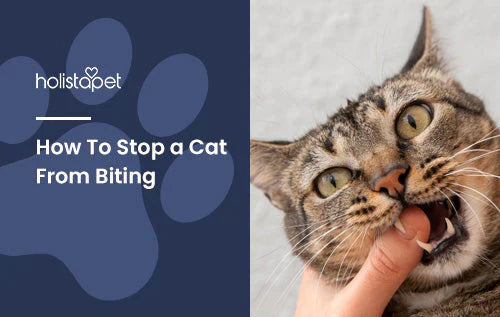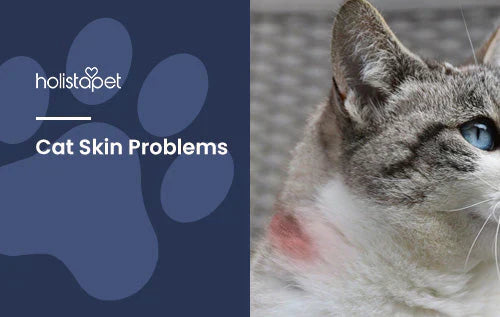You're petting your cat, and everything seems fine. They are purring and rolling around in bliss. But suddenly, you feel their sharp teeth dig into your finger. What gives? We are here to tell you how to stop a cat from biting! The first step in stopping cat biting behavior is figuring out the root cause. There are many reasons a cat will bite — and we'll go over them soon. The second step is to read your cat's body language.
While it may seem sudden, your cat most likely gave you some signals to stop before going in for the chomp. But once you better understand your cat and why they keep biting, there are ways to make them never bite you again. It's surprisingly easy — it just takes patience and consistency. Let's nip this thing in the bud!
Is It Normal for Cats to Bite?
How to get your cat to stop biting? Cats are so cuddly and cute. They are fluffy and have those little toe beans and big, innocent eyes. But then, mid-pet, your cat quickly turns its head around and bites your hand. What's that all about!? Is it normal for cats to bite you?
The short answer is: Yes!
There are many reasons cats bite, from playing and showing affection to letting you know they are in pain. It's a natural habit that cats form as a kitten. Kittens explore their new world by mouthing and chewing stuff — including you. Don't be alarmed by this behavior. And know that you can stop it from happening with the right training.

Why Do Cats Bite?
There are many reasons your cat might bite you. Sometimes it's not meant to hurt at all, and other times they are warning you to back off. Cats have sharp teeth — so it might hurt even if your cat didn't mean to cause pain. How to get cat to stop biting? Getting bitten by a cat is never fun. If you want to know how to stop the cat from biting, you must first figure out why they are biting you. That way, you can properly figure out how to prevent it from happening in the future.
It's a Gesture of Affection
How to get your cat to stop biting you? You'll often notice that your cat turns around to nibble on your hand when you're petting them. This type of cat bite is affectionately called a "love bite" by cat owners. That's because it's very gentle chewing that rarely hurts. This is behavior that your cat picked up as a kitten. In litters, kittens will bite each other as a way to bond and practice for adulthood.
But while a kitten bite might just tickle, remember that as a cat, it won't be so pleasant. It might even cause you to bleed. So you don't want to encourage this behavior in most instances.
Your Cat Wants to Play
During their time as a kitten, kitties will bite each other as a way to play-fight with their littermates. If this behavior hasn't been discouraged, your cat will also think that biting will initiate play with you as well. Sometimes cats will see your hand movement while petting them and get hyper. You'll notice them looking a bit more alert as they start seeing your hand movement as an invitation to wrestle and play. This will result in them biting you to see if they can start play-fighting.
Aggressive Biting
How do you get your cat to stop biting? Certain situations, events, and actions can trigger a cat to become aggressive. Some cats can become aggressive during a play session, meaning they take it a bit too seriously. This can even include stalking you and running up to bite you when you don't expect it. Cats will also become aggressive when they:
- Don't want to be pet anymore, and you noticed no signs.
- Become afraid of a certain situation (fireworks, a dog in the house), and you approach them while hiding, making them feel trapped.
- Are defending their territory from another animal.
- Are protecting their kittens.
- Try to establish dominance with you or other animals.
They're Anti-Social
A lot of people have feral cats living in their neighborhoods. In fact, there are sadly over 160 million feral cats in the United States alone. Sometimes you or a neighbor feeds them. But if you approach them too suddenly, they might scratch or bite you in hopes you'll back off. Feral cats are not as social as the cats that live inside your house, meaning they might be very suspicious of you and not want you to get too close.
Overstimulation
Researchers are still new to this "cat behavior" thing, so don't feel bad if you don't completely understand your cat's cues before the biting begins. Nobody is quite sure exactly why some cats will start to bite you when they otherwise seem to be enjoying a cuddle or petting session. But the most common reasons seem to be that your cat is overstimulated or attempting to control the duration of the petting.
How to break a cat from biting? Many cats are sensitive in certain areas, and if you keep petting that area, they might suddenly become overwhelmed and nip at you to get you to stop. This might be impulsive. Your cat might not be trying to hurt you but can't think of a faster way to make it stop.
When Is Biting Abnormal?
In most cases, cat bites are quite normal and can be prevented in the future. But there might be some cats that need some extra help outside of your training. If your cat is approaching you or other pets in hopes of attacking you, that is outside of the ordinary. Take your cat to the vet as soon as you can because there might be something wrong with their health or well-being.

How to Stop Cat From Biting
Even though cats are independent creatures who seem to do whatever they please, you can train a cat to stop biting you. You just need to make sure you are consistent and patient. Cats are intelligent and will soon realize that biting isn't appropriate.
Teach Them Early
Cats learn to bite for a variety of reasons when they are young. So if your cat is still a kitten, it's important to start the training now. A lot of people will shrug it off since kitten bites don't hurt. And riling up a kitten can be fun. But it's important to remember that this behavior will continue in the future when their bites will actually do damage.
Kittens start play-biting at about three weeks old. Their siblings and mother will teach them that biting hurts as they grow. A kitten taken away from their litter too early might be more prone to bite since their peers were not taught that biting is painful.
Offer Them Interactive Toys
Many times, kittens and cats will start playing with your hand mid-pet because they view it as a toy. I mean, it's moving. Why not? But it would be best if you never allowed this. Even if you are fine with your cat beating up your hand, other guests might become scared to pet your cat since they know it may lead to them getting scratched and bitten.
Every time your cat goes to play with your hand, move your hand immediately. Give them a stern expression and say "no" or hiss. And then immediately distract them from your hand with a more acceptable toy, like a plush mouse or jingly ball. Your cat will quickly forget about your hand and move on to its new prey.
Take Note Of Problem Areas
If your cat is usually biting you in response to getting pet, start taking note of when this usually happens. You'll most likely notice that it's after a certain amount of time or when you pet a certain part of their body. A lot of cats are sensitive on their stomach and their lower back right above the tail. Other cats don't like their paws being fondled. These areas can easily overstimulate or annoy certain cats, so don't keep petting them if your cat has tried to bite you for doing so in the past.
Pro Tip: Try CBD Oil or Treats
A lot of times, cats will bite because they are nervous or angry. A great way to stop a cat from potentially biting is to help them feel calm and safe. One way to do that is with CBD oil or CBD cat treats. CBD interacts with your cat's endocannabinoid system (ECS), which maintains their balanced health and well-being. The ECS has cannabinoid receptors that CBD indirectly latches onto, including some in the brain.
By affecting things in the brain, like serotonin, CBD can help calm your cat and keep them feeling soothed. CBD doesn't necessarily boost serotonin levels, but it may affect how a cat's brain receptors respond to the serotonin that's already in their system.
Identify If They're Stress or in Pain
Cats are experts at hiding pain. It's in their nature. For this reason, we sometimes aren't sure if our cat is hurting or has a disease. They might act perfectly fine on the outside. That's why we are caught off guard if they snap at us when we touch a specific area. If you notice that your cat is lethargic, isn't hungry, or has a change in litterbox habits, it's probably time to bring them to the vet as soon as you can. A veterinarian can examine them and find out if they have any conditions that are making them feel aggravated or frustrated.
Be Patient
The key to stopping your cat from biting is to have patience. It takes a lot of consistency to train a cat. It can sometimes be hard to resist their big, wholesome eyes and fluffy cheeks, but you have to say "no" every time they go in for the chomp. If you say "no" one time that they bite and then allow it the next (because it wasn't as hard or it was clear they were playing, etc.), your cat will not understand that biting is off-limits. Once cats realize that biting will halt petting and playtime, they will begin to realize that biting does more harm than good.
When Should I Take My Cat to the Vet for Biting?
Most cats bite as a defensive tool to get people to back off, usually after a few warning signs. But if your cat is approaching you with the intent to bite or scratch, your cat is exhibiting very concerningly aggressive signs. If this is the case, take them to the vet immediately to determine what's causing this threatening behavior.
You should also take a biting cat to the vet if you suspect that the source is discomfort or pain. If your cat seems to have a sensitive spot on their body or doesn't want to be approached, it's important to make them a vet appointment right away.

Final Thoughts
Biting is a normal cat behavior like licking themselves or playing in boxes. It's just part of being a cat. So your kitty might not realize that you don't like it. They might not even realize it hurts you. To get your cat to stop biting, you have to be consistent and make sure you always tell them "no" when they make their move. Even if you think it might be a gentle love bite or a playful chomp, this is inappropriate and shouldn't be encouraged. Cat bites can hurt — and guests might become scared to interact with your cat if it will lead to them getting bitten.
Luckily cats are very intelligent and will start to understand that biting will not be tolerated. All you have to do is have patience and be consistent. Offer your cat alternatives to bite, like toys and scratchers. And make sure your cat is getting enough love, care, and stimulation. Cats can be hard to understand at first. But once you start to pick up on their body language, you can avoid being bitten ever again!


 CBD Oil for Cats - Fast Acting
CBD Oil for Cats - Fast Acting
 CBD Cat Treats - Easy Dose
CBD Cat Treats - Easy Dose
 CBD Calming Chews for Cats - Highly Rated
CBD Calming Chews for Cats - Highly Rated
 CBG Oil for Dogs and Cats - Loved by Thousands
CBG Oil for Dogs and Cats - Loved by Thousands





Leave a comment
All comments are moderated before being published.
This site is protected by hCaptcha and the hCaptcha Privacy Policy and Terms of Service apply.